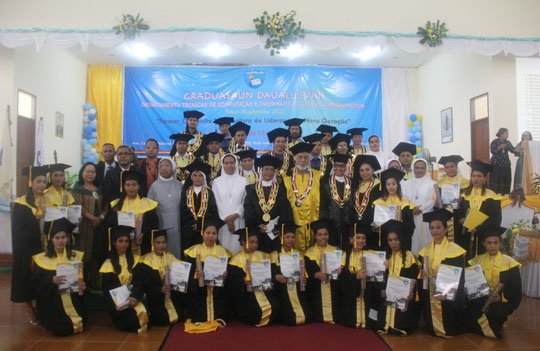Our Story
Brief History
Instituto Profissional de Canossa abbreviated IPDC, was founded by the Congregation of the Canossian Sisters in Timor Leste on 10 September 2003 with a mission to contribute in the formation of human resources with character, knowledge, skill and strong and deep faith in God for the good of the nation and for the glory of God.
At the beginning of its operation, IPDC offered two diploma courses: Office Management and Technical Computer and Informatics for high school graduates who are interested to join the professional world. In addition to preparing individuals who are ready to work, IPDC curriculum also gives an opportunity for graduates to continue their education to a higher level.
After its first five years of operation, in 2007, the East Timorese government through the Ministry of Education initiated a process of accreditation of all higher education institutions in Timor-Leste. It took two years of preparation until finally on September 24 2009, through the Decree of Ministry of Education no. 34/GM-ME/IX/2009, IPDC was granted an accreditation for its operation with a grade of 92.88% by an international accreditation team in cooperation with the National Accreditation Bureau (ANAAA). With this new status, IPDC has successfully produced 120 young graduates with Computer and Office Management qualifications during its two periods of graduation.
With IPDC’s education delivery developing on a solid foundation, together with the growing interest of the society for expertise in the field of Computers, after a decade (2003-2013) the Canossa Foundation has addressed the challenges posed by the International team of Accreditation and upgraded the level of education delivery at IPDC to Strata 1 for the department of Technical Computer and Informatics (TCI)
The establishment of Informatics (TCI) is preceded by a feasibility study carried out by the Quality Assurance Office of IPDC and submitted to the Department of Higher Education in May 2012 and thus Department of Technical Computer and Informatics was established in January 2013 with the level of Honors / Licensure degree. The Curriculum for honors degree/Licensure degree consists of 3200 hours with 213 credit points . The Minimum Curriculum content is therefore 2400 hours, which is equal to 160 credits for Bachelor degree. The construction of the Curriculum is based on the standards set by the Ministry of Education, and combined with the needs of Information Technology of both the national and international scale. A Survey study covering both national and international curriculums of Technical Computer and Informatics has been used to design the Curriculum of TCI at IPDC. The curriculum represents the benchmark requirements for the level of qualification in the core concentration and electives.

Our Vision
Technical Computer and Informatics (TCI) study program envisioned as an excellent center for the formation and development of students with the professional and academics skill in field of Technical Computer and Informatics holding on religious and moral principles.
Our Mission
Based on the vision of IPDC and Vision of TCI study program the mission of TCI Study program describes as following ;
Carry out and implement excellentquality academic programs of teaching and learning process in the field of technical computer and informatics to produce graduates with the ability to work and competitiveness with national and international level in such a way as to uphold their religious values and moral principles.
Carry out research and development activities that have contributed to the advancement of science and technology in the field of technical computer and informatics specially hardware, software engineering, networking and multimedia.
Organizing and developing and fostering community service activities that contribute to the development of society in the use of information technology (ICT) as a tool in various aspects of life that are in accordance with the development and needs of the community in order to support the nation’s development.
Goals
i. The Goals of Technical Computer and Informatics (TCI ) Licentiate degree program :
TCI licentiate degree is designed as integrated degree from bachelor to licentiate degree to train and produce students who have academic and professional skills in the field of TCI.
ii. The goals of study programs are designed as following:
1. To train students to become highly –qualified individuals, professionally and academically in the field of technical computer and informatics with specialization in Computer engineering, software engineering, system analyst and networking engineer grounded in Christ Crucified-centered Education.
2. To develop students capacity towards employment for the national and international organizations, industry, business and government in the field of TCI.
3. To train student towards entrepreneur. Skills for Self-employment.
Objectives
Technical Computer and informatics (TCI) study program has been designed with the objective to:
Produce high quality and innovative students and graduates that have strong analytical and critical thinking skills to solve problems by applying knowledge, principles and skills in IT as computing and user support, database and information management, digital media and immersive technology, networking and convergence, programming and application development with the specialization in Computer engineering, software engineering, system analyst and networking engineering.
Train students to be ready to be enlightened for working in an organization and as an entrepreneur in the field of computer technology and information systems (ICT) with the core ability in the workplace skills as follows:
i. Work oriented, of both theory and practice towards self-development in the field of TCI.
ii. Ability to sustain continuous learning through research, self-assessment, based on new ideas and information in the developing of capabilities for lifelong learning.
iii. Ability to apply their working competencies in the field of TCI, as in teams and individual through strong communication skills.
iv. Ability to exhibit as professional, legal and ethical behavior.
